How Recurring Events can Impact your SEO Results (And How to Improve that)

The Events Calendar Pro plugin provides powerful features for event management, like shortcodes, Event Series, and additional calendar views.
Among its various functionalities is the ability to create Recurring Events, which can be a real-time-saver for event organizers.
While this feature is incredibly convenient, it may pose a Search Engine Optimization challenge for some website owners. This is a highly requested feature from many of our customers, and we’re always working on improving our plugins.
Potential issues may arise when multiple occurrences of a recurring event are indexed by search engines, leading to duplicate content if you don’t manually edit each event occurrence.
In this article, we’ll dig deeper into that topic to help you understand why having recurring events with identical titles, images, and event descriptions can be problematic for your site’s SEO.
We’ll also talk about solutions and propose some possible alternatives to make your experience managing recurring events and SEO easier.

The SEO Challenge: Managing Recurring Events
What exactly does “Duplicate Content” mean on SEO
Duplicate content refers to textual, visual, or structural elements that either exactly replicate or closely resemble content found on other websites or multiple pages within the same website.
The presence of substantial duplicate content can be a problem as you may not have control over which event will be considered the “original” article and which ones will be considered the duplicate. This may make your next event regarded as “less important” for a search engine than an event that is still a long way from happening, which can be confusing for your visitors.
Note that manually creating single events that have the same content (for example, using the duplicate event feature) or equal in most part will always be considered duplicated content.
We’ll focus on recurring events in this article, but all those principles apply when thinking about any event content creation.
User Experience
Duplicate content also diminishes user experience and can provide low-quality content for search engines. And SEO is not only about search engine bots but about people!
Google provides an excellent document entitled Creating helpful, reliable, people-first content.
Let’s think of a new site visitor that goes to your default calendar page (usually, the /events URL).
When that visitor searches for an event, and multiple instances of the same event appear in the search results, it can be confusing and frustrating. They’ll quickly note that the dates are different, but if the title and excerpt are the same, you’ll only be helping them a little.
Improving the calendar view experience for your visitors
For calendar views pages, when visitors find your events and decide where to click, you may have a poor user experience when many events look like each other.
Here’s an example showing how the list view looks like when you have some recurring events after each other:
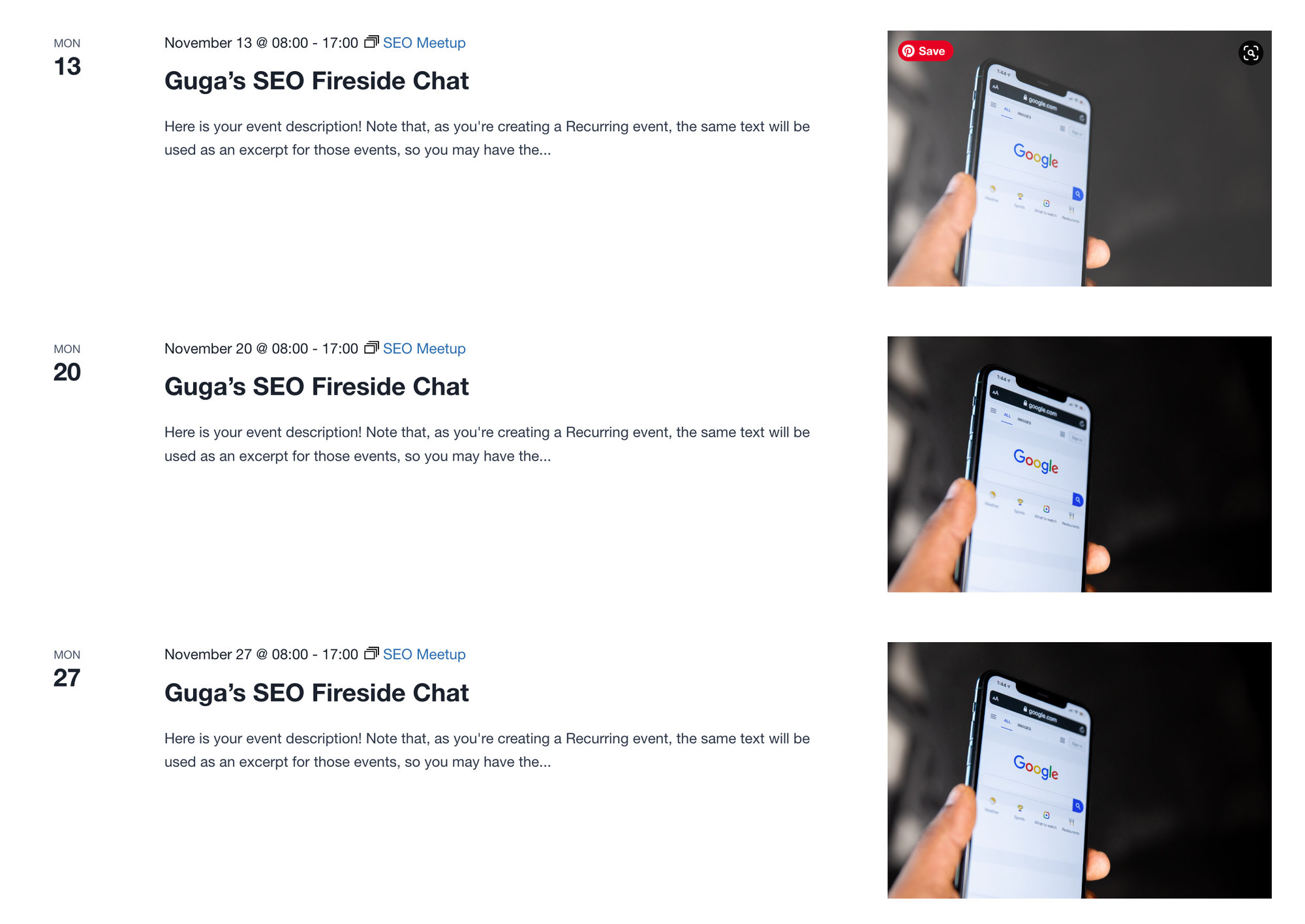
Let’s improve that. Here are some suggestions of what you can apply to improve the User Experience and your SEO efforts simultaneously.
Suggestions for unique titles
Having multiple events with the same title can be confusing for users and problematic from an SEO standpoint. While the convenience of identical titling is tempting and can save you time, it’s essential to remember that each event is unique and should be treated as such.
Here are some SEO recommendations that can help differentiate these events for both search engines and site visitors.
Date / Time
Including the date/time in the title can instantly set each event apart.
For example, instead of “Charity Run” for all the events, you could title them “Charity Run – November’s Morning Edition” and “Charity Run – November’s Evening Edition.”
Location
If the events happen in different locations, include the place in the title. For instance, “Yoga Retreat – Harlem” and “Yoga Retreat – Union Square” provide geographical context.
Target Audience or Level
If the event is tailored for a specific audience or level of expertise, include that information. For example, “Photography Workshop for Beginners” and “Photography Workshop for Professionals” can distinguish two otherwise similar events.
Event Sequences
If the events are part of a series, numbering them can help. For instance, “Webinar on Healthy Eating – Part 1” and “Webinar on Healthy Eating – Part 2” can signify a sequence or progression.
Dealing with event content and images
Again, when creating recurring events, all your events will use the same content. So, let’s consider the content you’re using to describe your events.
Event content
You can improve the event content by adding different images, highlighting in your text what will be different on that single event (for example, topics, speakers, location, etc.), and using additional images, videos, etc, to make sure you’re adding significant differences between those different event editions.
Also, to improve the user experience on your calendar view pages, you can provide a text description that shows only there.
When editing an event, you can use the Excerpt field to add a unique description for each event manually.
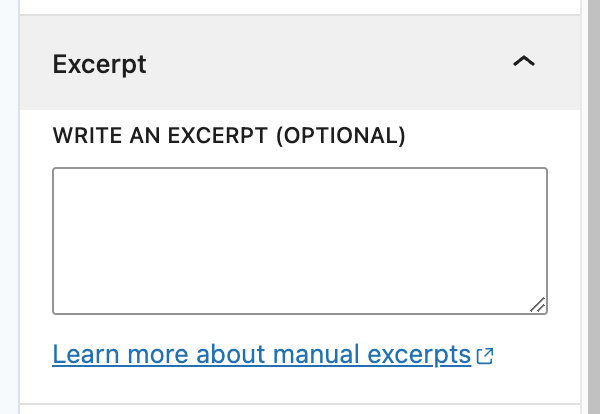
Note: When editing one occurrence of a Recurring event, you can convert it to a single event. That gives you freedom to make changes without impacting all the other event occurrences and keeps that event on the same Series it was added before.
Event images
To have a better user experience and visual differences between your events, creating different Featured images that clearly show differences should help.
You can create an image pattern/template for that event and have versions with different/alternative colors, dates showing on that image, or anything that can help your visitors have a better experience and help them see that those events are not always the same.
With all those changes, the calendar view will look better, improving the page readability and letting your visitors understand that those events are from the same series but not the same.
Here’s a screenshot after some changes:
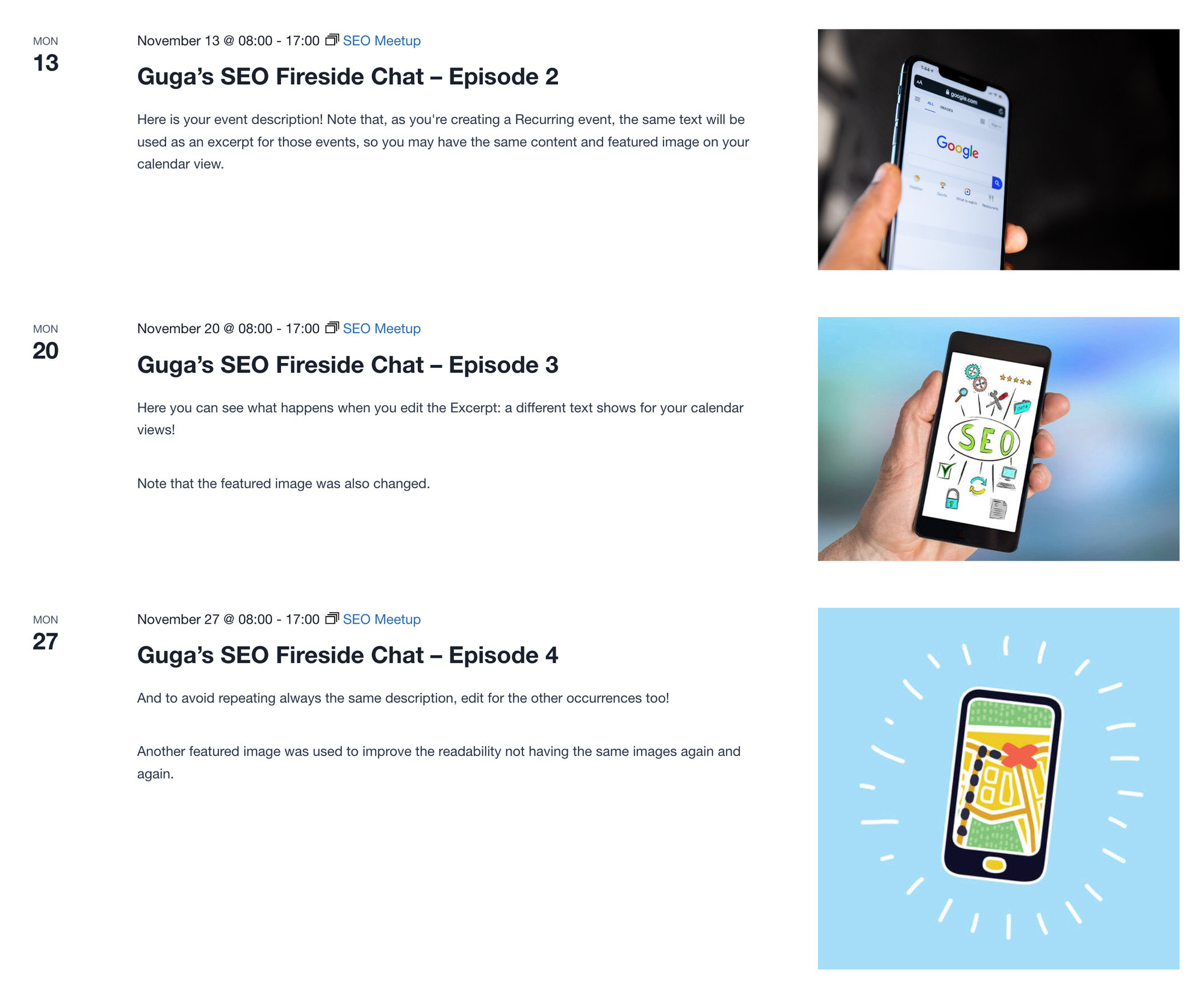
I already have many events. Are there other alternative options?
If you already have many events on your website, we totally understand that editing all those events will not be an easy task, and there are some great alternatives.
We can provide some workarounds, but remember that “workarounds” may not be treated as the general rule.
Alternative 1 – Using Canonical tags
In the intricate world of SEO, understanding how to guide search engines through your content correctly is crucial. One powerful tool in your SEO arsenal is the canonical tag. But what exactly is a canonical tag, and how does it work?
The canonical tag, also known as “rel=canonical,” is an HTML element that helps search engines understand which version of a URL you want to appear in search results. It is placed in the head section of a webpage’s HTML and points to the “canonical” or preferred version of that page.
Essentially, it passes a message like “Yes, we have pages with similar content, but the one set as canonical is the most useful. Please prioritize it in search results.” for search engines.
Adding a canonical tag on your recurring events will let search engines index all event occurrences but show that you know those pages are similar.
The easiest way to do that is also using an SEO plugin.
We’ll use the Yoast SEO plugin to illustrate that but note that this is also possible with other SEO plugins (like the Rank Math SEO).
Steps to achieve that using the Yoast SEO plugin:
- Publish your recurring event.
- Get the URL for the single occurrence that you want to show is the most useful one.
- Edit your event and add that URL as a canonical URL.
- Save the event, apply the changes for all occurrences, and that’s it!
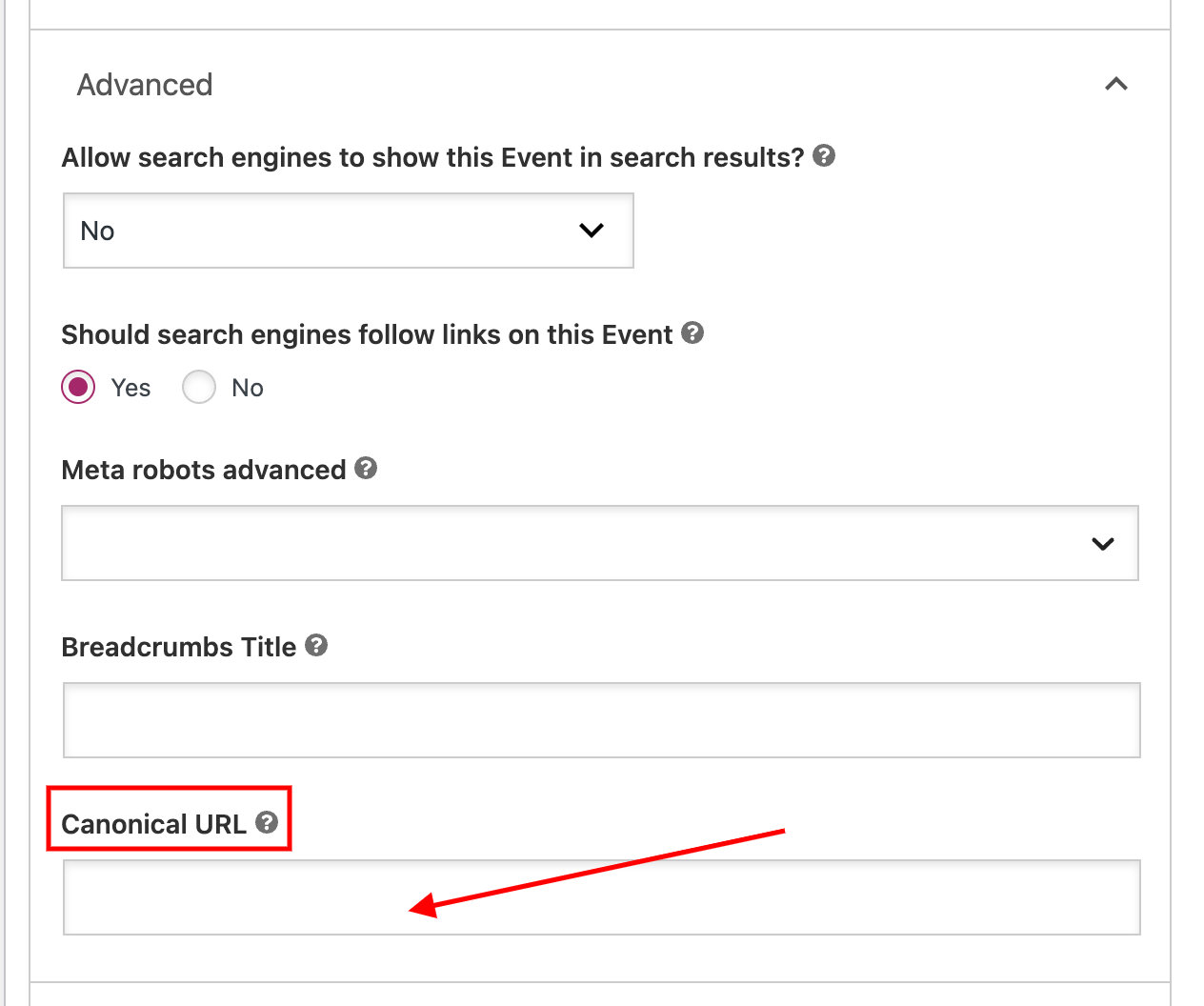
Alternative 2 – Not indexing recurring events
If, after reading this, you decide not to have your recurring events indexed, we can provide you with a way to do it.
If you decide not to have recurring events indexed, they’ll not be found when performing searches on Google or other search engines, but you will still have them for your site visitors.
The alternative to still have the event found on Google is to create a page or blog post about your event (so that one can be indexed). Then, use the plugin shortcodes to list all events on the same category if you need to list all the Event occurrences on that page.
To not index your recurring events, you can use an SEO plugin like Yoast SEO and not allow search engines to show this Event in Search Results.
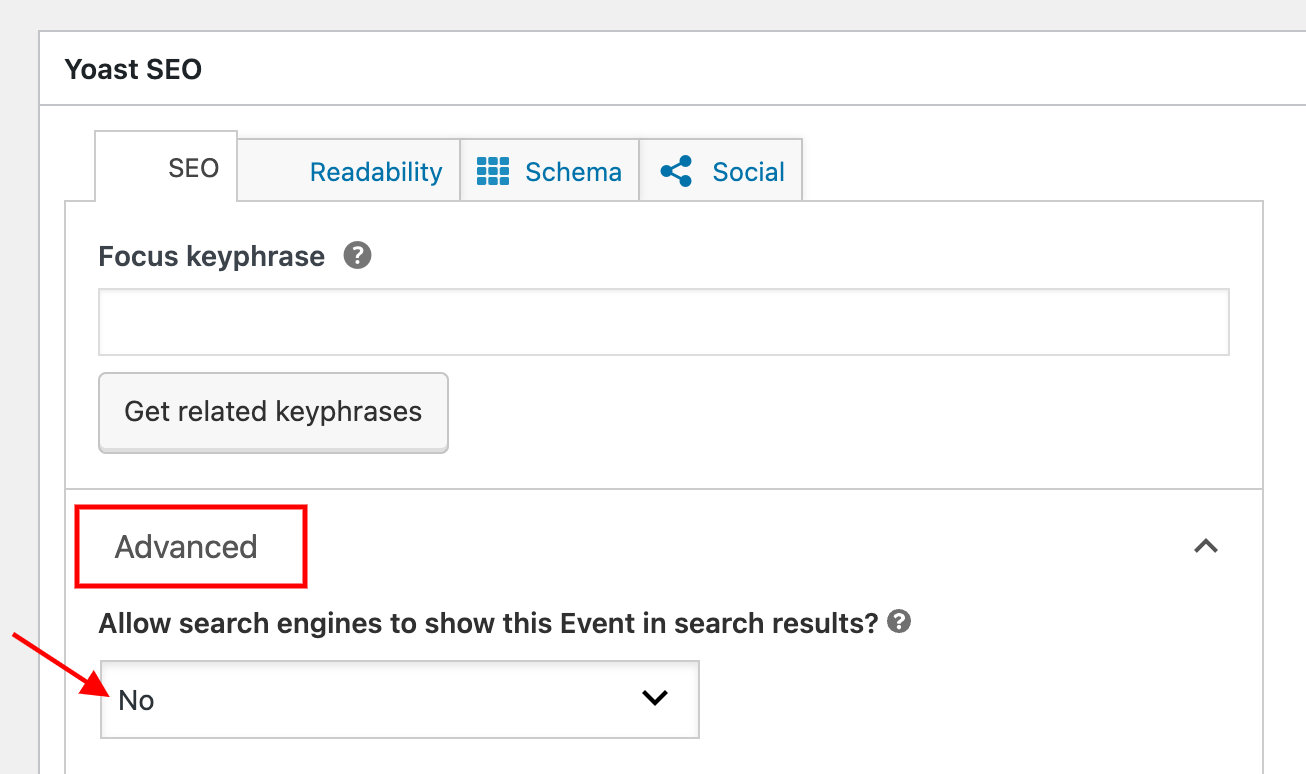
As you’re creating a recurring event, that setting will be used for every event occurrence.
If you don’t use an SEO plugin and want to programmatically not index any recurring event you’ll create on your website, you can use the first PHP snippet shared in this Knowledgebase article.
Alternative 3 – Index only the first event occurrence
We have already received some requests asking how to have only one occurrence of a recurring event indexed, the first occurrence, and not let search engines index the others.
For that, you can check the same Knowledgebase article mentioned before, but use the second PHP snippet shared there.
Also, note that we suggest these alternatives as the last resources if you don’t have enough time/energy/resources to edit all your events and improve what we indicated before. The best alternative will always be having high-quality, original content for each event occurrence.
Conclusion
The ability to create recurring events in Events Calendar Pro is undoubtedly worthwhile. Still, it’s crucial to understand the SEO implications of this feature and how your decisions when using the plugin impact your results.
By ensuring that you’re following the best practices when managing your events, you can maintain the SEO integrity of your project while still taking advantage of the convenience offered by the plugin features.